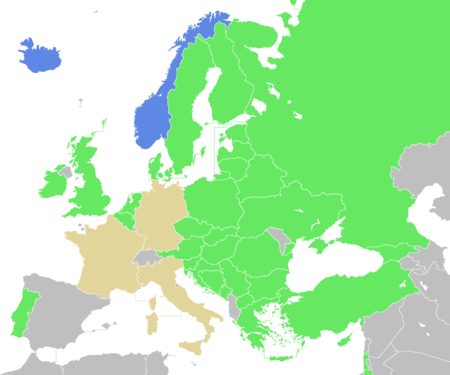FIBA Europe Cup
The FIBA Europe Cup, officially abbreviated as FEC[1] is an annual professional club basketball competition organised by FIBA for eligible European basketball clubs. It is the European-wide second level. Clubs mainly qualify for the competition based on their performance in their national leagues and cup competitions, although this is not the sole deciding factor, as sometimes clubs that did not win their league can still qualify.
 | |
| Founded | 30 June 2015 |
|---|---|
| First season | 2015–16 |
| Region | Europe |
| Confederation | FIBA Europe |
| Number of teams | 32 (regular season) 48 (total) |
| Promotion to | Basketball Champions League |
| Current champions | |
| Most championships | 4 teams (1 title) |
| Website | www |
History
_16.jpg)
On June 30, 2015, FIBA announced it would start a new league to compete with Euroleague Basketball's EuroCup.[2] The new competition, which replaced EuroChallenge, was supposed to be open for up to 100 teams to enter.[2]
The first FIBA Europe Cup game was played on October 21, 2015, when Donar Groningen beat Egis Körmend 78–71. In the 2016–17 season, FIBA started the Basketball Champions League and since then teams from the Champions League can be transferred to the Europe Cup through their position.
Format
Tournament
The tournament proper begins with a regular season of 32 teams, divided into eight groups. Seeding is used whilst making the draw for this stage, whilst teams from the same country may not be drawn into groups together. Each team meets the others in its group in home and away games, in a round-robin format. The winning team and runner-up from each group then progress to the second round with 16 teams divided into four groups. Each team meets the others in its group in home and away games, in a round-robin format.[3]
For the play-offs, the winning team and runner-up from each group join them and play a two-legged format. Until 2019, the fifth-placed teams and sixth-placed teams were dropped from the Basketball Champions League regular season. The regular season is played from October to December and the second round is played from December to January, whilst the play-offs start in February.[3]
Finals
The Finals were played in either a Final Four tournament format or with a two-legged series.
| Year | Final | Third and fourth place | |||||
|---|---|---|---|---|---|---|---|
| Champion | Score | Second place | |||||
| 2015–16 Details |
Fraport Skyliners |
66–62 | Openjobmetis Varese |
Élan Chalon |
Enisey | ||
| 2016–17 Details |
Nanterre 92 |
140–137 (58–58 / 82–79) |
Élan Chalon |
||||
| 2017–18 Details |
Umana Reyer Venezia |
158–148 (69–77 / 81–79) |
Sidigas Avellino |
||||
| 2018–19 Details |
Banco di Sardegna Sassari |
170–163 (89–84 / 81–79) |
s.Oliver Würzburg |
||||
| 2019–20 Details |
Curtailed and voided due to the COVID-19 pandemic.[4][5] | ||||||
Performance by club

A total number of 83 clubs from 35 FIBA member countries have participated in the competition. The competition has been won by 2 clubs from 2 countries.
| Club | Winners | Runners-up | Years won | Years runner-up |
|---|---|---|---|---|
| 1 | 0 | 2016 | – | |
| 1 | 0 | 2017 | – | |
| 1 | 0 | 2018 | – | |
| 1 | 0 | 2019 | – | |
| 0 | 1 | – | 2016 | |
| 0 | 1 | – | 2017 | |
| 0 | 1 | – | 2018 | |
| 0 | 1 | – | 2019 |
Statistics
All-time leaders
| Player | Total | Games | |
|---|---|---|---|
| Points | 897 | ||
| Rebounds | 380 | ||
All-time records
| Category | |||
|---|---|---|---|
| Efficiency | 46 | ||
| Points | 39 | ||
| Rebounds | 19 | ||
| Assists | |||
| Steals | 9 | ||
| Blocks | 6 | ||
| Three-pointers | 11 | ||
Source: FIBA Europe Cup As of 2 May 2017.
Awards
After each round, the FIBA Europe Cup awards the "Top Performer" honour to the best player of the given round. In its inaugural season, the competition had a Final Four MVP award for the best player of a given Final Four. However, since 2015–16 the award has not been handed out.
Winning rosters
See also
References
- Competition Regulations Page 4 of 49.
- "FIBA Europe Board pushes ahead with attractive club competitions model". FIBA Europe. June 30, 2015.
- "2017–18 FIBA Europe Cup regulations" (PDF). FIBA.com. Retrieved 18 June 2017.
- "FIBA Europe 2019-20 club competitions will not resume, Board sets plan for 2020-21". FIBA.basketball. Retrieved 16 June 2020.
- "FIBA Europe confirms suspension of EuroLeague and EuroCup Women, FIBA Europe Cup until the end of the club season". FIBA. 13 March 2020.